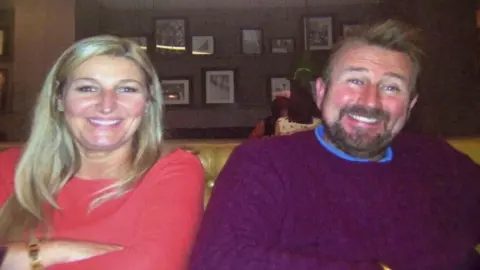Couple ordered to pay back £8,000 of £2.4m mortgage fraud
 BBC
BBCA couple who were convicted of a £2.4m mortgage fraud scheme have been ordered to pay back £8,000.
Edwin McLaren and his wife, Lorraine McLaren, from Renfrewshire, conned dozens of people in financial difficulty between 2008 and 2012.
They were found guilty of fraud in 2017 after a 20-month trial - the longest criminal trial in Scotland.
They were both made subject of Confiscation Orders at the High Court in Edinburgh.
The order to pay back the the profits of their crimes showed that Edwin McLaren, 56, was estimated to have benefited from criminal conduct by £1,722, 366.64. He was to pay £4,000 based on assets currently available.
Lorraine McLaren, 65, was estimated to have benefited by £694,950 and was ordered to pay back £4,213.38.
Prosecutor Murdo MacTaggart told judge Lord Arthurson that the Crown and McLaren had agreed that he had made £1,722,366.64 during his "course of criminal conduct".
McLaren told the court that he "agreed" that the £1.7m figure was correct.
However, both sides had agreed that the Crown could only recover £4,000 from McLaren at this point in time.
A Crown spokesman said it had the power to extend the order to seize money and assets the McLaren's acquire in the future to pay back the full amount they made from their crimes.
In 2017, Mr McLaren, who was said to be the brains behind the scheme, was jailed for 11 years. His wife was jailed for two-and-a-half years but was released after nine months.
The couple's lavish lifestyle included luxury holidays in Dubai, a £100,000 ring, private schools for their children, leasing a Bentley Continental and paying the mortgage on the £750,000 family home in Bridge of Weir.
At one point during the long running proceeds of crime action, prosecutors wanted McLaren to explain £9m which passed through his bank accounts.
'Treated with disrespect'
McLaren accused Crown lawyers of incompetence. He said that prosecutors had originally sought explanations for £1.6m cash that had passed through this account and that this figure had repeatedly changed.
McLaren, who was representing himself, said: "First, they said the figure was £1.6m and it was then £3m and it was £5m and now they want £9m.
"The Crown have treated my wife and I with tremendous disrespect."
He agreed with the £1.7m figure.
He added: "There were others who have benefited from that figure including the clients."

Lorraine McLaren's advocate Tony Lenehan told the court that she had also came to an agreement with the Crown - she had made £694,950 from criminal conduct. However, prosecutors can only recover £4,215.38 from her at this time.
Lord Arthurson made an order stating that the McLarens should hand the cash over within six months.
The legislation on proceeds of crime means that the Crown can return to court to seize more money if it becomes aware that the McLarens have more assets.
Jennifer Harrower, procurator fiscal for serious casework, said: "Edwin McLaren carried out a series of calculated deceptions for years, remorselessly conning people who were struggling financially.
"His actions were conducted in such a covert way that it took investigators a considerable amount of time to unpick the chain of events before securing a conviction.
"Even after that conviction was secured, the Crown pursued Proceeds of Crime action to ensure the funds Edwin McLaren obtained illegally are confiscated."
Title deeds transferred
The frauds, which took place between April 2008 and November 2012, came to light when a woman in Fife claimed she had not been paid the full amount that she was promised for the sale of her house in Cowdenbeath.
During a two-year police inquiry, 48 properties were investigated under a property fraud scheme where the owner's title deeds were transferred without their knowledge.
Twenty-nine cases made it on to the indictment in court, involving properties throughout Scotland.
The jurors had to listen to 320 days of evidence, sparking critics to question at the time whether juries should be used in complex fraud cases.
The cost of the trial is thought to have been about £7.5m, with more than £2.4m in legal aid paid for defence lawyers.
It was also the first time in Scotland that evidence was led from the house of a witness who was too ill to attend court.
The house was set up as a court with all the legal trappings needed for the woman to give evidence.